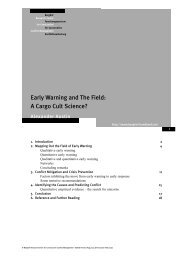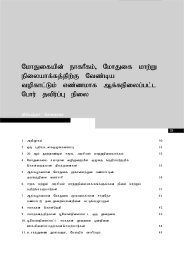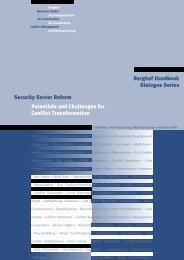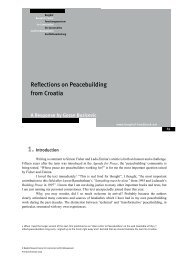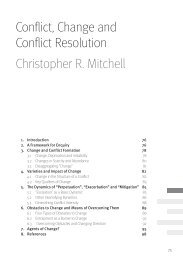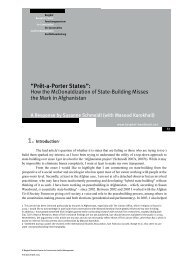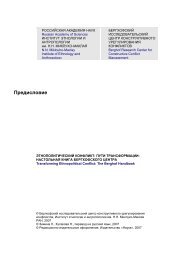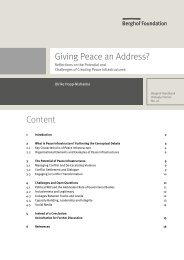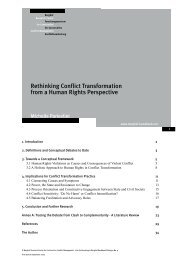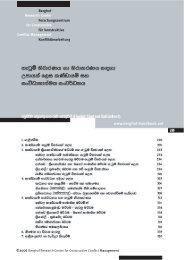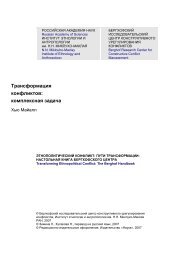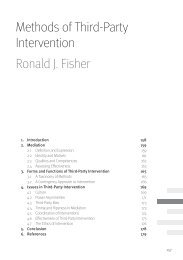Human rights and conflict transformation: The challenges of just peace
Human rights and conflict transformation: The challenges of just peace
Human rights and conflict transformation: The challenges of just peace
Create successful ePaper yourself
Turn your PDF publications into a flip-book with our unique Google optimized e-Paper software.
Conflict Transformation <strong>and</strong> <strong>Human</strong> Rights:<br />
A Mutual Stalemate?<br />
Alice Nderitu<br />
www.bergh<strong>of</strong>-h<strong>and</strong>book.net<br />
<strong>The</strong> statement that begins the conclusion <strong>of</strong> Michelle Parlevliet’s lead article provides a good entry<br />
point into the much discussed <strong>and</strong> rarely agreed upon topic <strong>of</strong> <strong>conflict</strong> <strong>and</strong> human <strong>rights</strong>. She states:<br />
“Over the years, I have <strong>of</strong>ten wondered why the mutual stereotypes about human <strong>rights</strong> actors <strong>and</strong><br />
<strong>conflict</strong> <strong>transformation</strong> practitioners remain so strong” <strong>and</strong> why “the perception <strong>of</strong> a clash between<br />
the two fields [is] so persistent, despite the increasing recognition <strong>of</strong> the close link between human<br />
<strong>rights</strong>, <strong>conflict</strong> <strong>and</strong> <strong>peace</strong>” (in this volume, 33).<br />
In quite a number <strong>of</strong> ways, human <strong>rights</strong> <strong>and</strong> <strong>conflict</strong> <strong>transformation</strong> would appear to be<br />
naturally suited. In many cases both work towards seeking to end human suffering. <strong>Human</strong> <strong>rights</strong><br />
<strong>and</strong> <strong>conflict</strong> <strong>transformation</strong> practitioners, however, may agree that they are naturally suited on paper,<br />
but they rarely do so in practice. It is crucial to address the background to this mutual stalemate so<br />
as to underst<strong>and</strong> why this is so <strong>and</strong> whether it can be resolved.<br />
<strong>The</strong>re are many reasons for the stalemate. <strong>The</strong>y include the historical development <strong>of</strong><br />
human <strong>rights</strong> <strong>and</strong> <strong>conflict</strong> <strong>transformation</strong> as separate disciplines; the different influences <strong>of</strong> armed<br />
<strong>conflict</strong> <strong>and</strong> the cold war on both; <strong>and</strong> the lack <strong>of</strong> a complete human <strong>rights</strong> framework in relation<br />
to all aspects <strong>of</strong> <strong>conflict</strong> <strong>and</strong> <strong>peace</strong>building (<strong>and</strong> vice versa) which has led to gaps in the definition<br />
<strong>of</strong> specific human <strong>rights</strong> goals <strong>and</strong> in the steps taken for their realization in implementing <strong>conflict</strong><br />
<strong>transformation</strong> processes. It has been argued elsewhere that the “business <strong>of</strong> building <strong>peace</strong> <strong>and</strong> the<br />
business <strong>of</strong> building a robust regime for the protection <strong>of</strong> human <strong>rights</strong> are hardly mutually exclusive<br />
endeavours” (Putnam 2002, 264) <strong>and</strong> also that human <strong>rights</strong> <strong>and</strong> <strong>conflict</strong> are interlinked to the extent<br />
that human <strong>rights</strong> abuses are both symptoms <strong>and</strong> causes <strong>of</strong> violent <strong>conflict</strong> (Parlevliet 2002). <strong>The</strong><br />
mutual stalemate, though, results from <strong>and</strong> in competing interests that affect the general applicability<br />
<strong>and</strong> enforcement <strong>of</strong> both human <strong>rights</strong> <strong>and</strong> <strong>conflict</strong> <strong>transformation</strong>. Before turning to this mutual<br />
stalemate in more detail, some conceptual issues need to be addressed.<br />
© Bergh<strong>of</strong> Conflict Research/ Bergh<strong>of</strong> Forschungszentrum für konstruktive Konfliktbearbeitung. Bergh<strong>of</strong> H<strong>and</strong>book Dialogue No. 9 – First launch June 2010<br />
55



